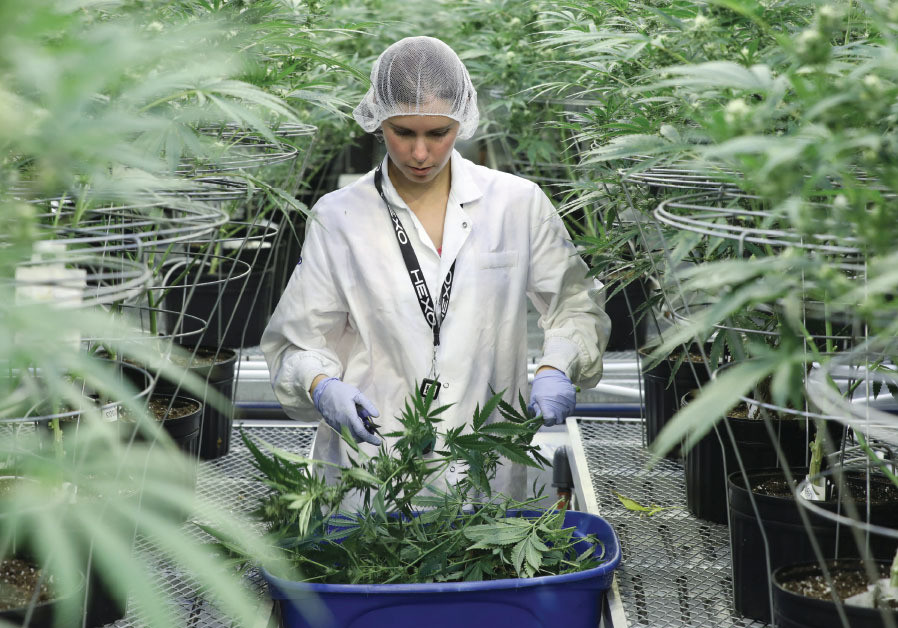As Canada legalizes recreational cannabis, Israel considers lifting export ban

COLLECTING CUTTINGS from cannabis plants at Hexo Corp’s facilities in Gatineau, Quebec, Canada, on September 26. (photo credit: REUTERS)
With Canada set to legalize recreational use of cannabis on Wednesday, a top Israeli official said on Tuesday that the government may lift its export ban before the next election.
Mike Rimon, a partner at the law firm Meitar Liquornik, told The Jerusalem Post that Foreign Trade Administration Export Policy Director Itai Melchior had made the hopeful announcement at a conference in Tel Aviv about the state of the Canadian and Israeli cannabis markets.
According to media reports, Prime Minister Benjamin Netanyahu has been blocking Israelis from exporting cannabis for months following a request to that effect from US President Donald Trump.
This is in spite of the fact that Netanyahu has encouraged cannabis research and domestic use for medical purposes, and in spite of Israel’s history as a leader in cannabis medical research dating back to the 1990s.
Rimon said that Melchior indicated an awareness that the export ban was “putting on hold many potential transactions looking to benefit from the export of cannabis from Israel” which could lead to revenue in the billions.
He said Melchior was optimistic that if the government remains in place until November 2019, that legislation would be completed to remove the ban and capitalize on the massive economic opportunities.
It was less likely that the export ban would be removed if the government called early elections.
Rimon presented to the conference the legal and regulatory tricks of the trade to working deals in Israel, especially cross-border joint ventures between Israeli and Canadian (or other foreign) companies, in the event that the export ban is removed.
He noted the unique pitfalls and challenges “resulting from an industry under ongoing and dynamic regulation which is not yet set in stone and subject to ongoing changes.”
According to Rimon, cannabis joint ventures would require getting approval from the Health Ministry, the Israel Land Authority, the police, the Agriculture Ministry and a variety of zoning approvals.
From a tax law perspective, he said cannabis transactions would be more complicated because there are very few precedents and it would be hard to set the tax value “of these ventures because most valuations are on a future basis.”
Noam Goodman, a partner at DLA Piper Canada, who also presented at the conference and spoke to the Post, discussed the significance of Canada becoming the first major country to legalize recreational cannabis use, set for Wednesday.
Goodman discussed the regulatory frame work for supplying, processing and using cannabis for either medical or recreational purposes in Canada.
He detailed “how Canadian or foreign companies, including Israeli companies, can go public in Canada and get access to capital markets to raise capital for cannabis businesses.”
Reviewing cannabis-related capital markets trends, he also said that the US market was especially active in 14 states where cannabis is legal for medical and recreational use.
In contrast to the US where the federal government has a ban on cannabis, but a number of states have legalized it, he said Canada has uniformly legalized cannabis.
Goodman said that US federal law banned cannabis even under the Obama administration. But while the rule was to ignore anti-cannabis enforcement during that era, under Trump’s Attorney-General Jeff Sessions the non-enforcement rule has been repudiated, and there are even some efforts to keep foreign cannabis investors out of the US, he said.
He added that Israel still had a major opportunity to take advantage of its technological and agricultural advantages in exporting cannabis, but that eventually, if it did not remove its export ban, countries like Colombia and African countries would take advantage of the continuous high demand for cannabis and grab the business for themselves.
Join Jerusalem Post Premium Plus now for just $5 and upgrade your experience with an ads-free website and exclusive content. Click here>>






Comments are closed.